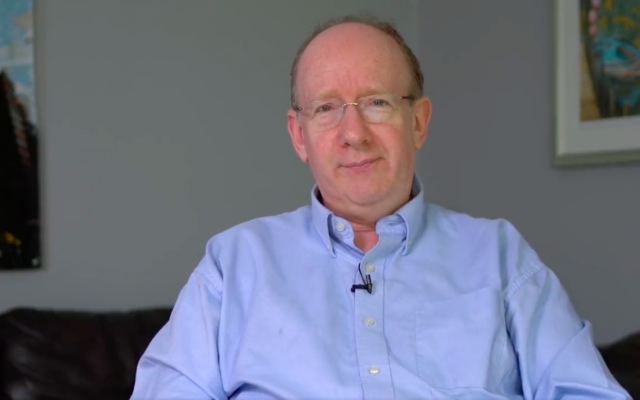‘Mum used to gently say, “They made us buy these yellow stars”
Journalist and author Daniel Finkelstein speaks to Jewish News about his remarkable new book detailing his family's battle to overcome Hitler's camps and Stalin's Gulag
Lee Harpin is the Jewish News's political editor
Daniel Finkelstein says he had always known that one day he would come to write his family memoir.
But it took the onset of the Covid pandemic, which dragged him away from a cycle of meetings,Times newspaper articles and frequent travel, to allow him the time and space to complete the book.
In Hitler Stalin Mum and Dad, A Family Memoir of Miraculous Survival, the Conservative peer manages to detail calmly and movingly the near-catastrophic impact Hitler and Stalin had on his family.
It is rare to find a book that succeeds on so many levels: as a real-life story, giving insight into how as young children, his mother Mirjam survived the Belsen death camp and his father Ludwik escaped the Gulag labour camp system; and as a historical document shedding light on the impact of the August 1939 Molotov-Ribbentrop Pact between Josef Stalin and Adolf Hitler.
The book is also an undoubted warning about the creeping danger of populist political ideals and the spreading of conspiracy theories in the modern era.
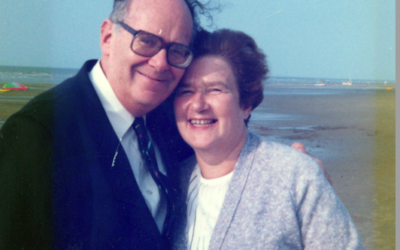
“The way I put it is that the Nazis arrested people because they were Jewish, who happened to own shops, whereas the Soviets arrested people who own shops who happen to be Jewish,” Finkelstein reasoned as he spoke to Jewish News.
“But it actually had the same effect on the people they did it to.
“And it was all about thinking that my 10-year-old mother and father were members of an elite that would actually be, in some way, kind of less than human.
But they were also more than human, because they were posing a danger to the kind of true spirit of mankind, whatever it happens to be.”
Within its absorbing 390 pages, Finkelstein invites the reader back into the lives led by his mother’s parents Grete and Alfred Wiener in Berlin, and those of Lusia and Dolu (Adolf) Finkelstein, his father’s parents, living in Lwów in Poland, now Lviv in Ukraine.
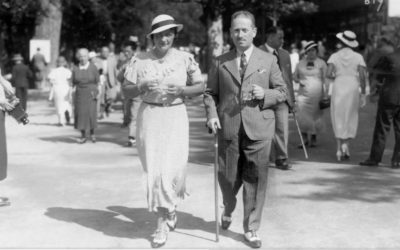
(pic Finkelstein family collection)
As the 1930s arrived, both families were living in relative comfort as political change began to take hold in Europe.
Alfred, a decorated hero from the Great War and later founder of the Wiener Holocaust Library, is seen as perhaps the first person to recognise the threat Nazis’ posed to Germany’s Jews.
As early as 1919 he had written of an “antisemitic storm” sweeping the country and began to archive evidence of Hitler’s threat to the world.
Convinced that Germany was no longer safe, he moved his family – Finkelstein’s mother Mirjam was the youngest of three girls – to Holland in 1933.
In Amsterdam, where they were initially happy, Anne Frank would even become a school classmate.
But as Alfred became increasingly outspoken about the Nazis, he was viewed with increasing suspicion by the Dutch authorities, who attempted to remain neutral as war clouds formed across Europe.
In an act for which Finkelstein reveals he holds no grudge against Alfred, he left Amsterdam in 1939 for London, without his family, going on to provide crucial intelligence information to the Allied Forces. But the visas that were intended to bring his wife and children to the UK arrived only at the same time as the Nazis invaded Holland.
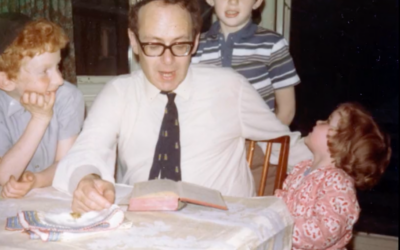
Meanwhile, that same year, Finkelstein’s family also became the target of Stalin’s ruthless purge of the Polish “bourgeoisie”, with Dulu’s status as a wealthy industrialist leading to him being arrested and sent to a prison camp.
His wife and his son, Ludwik, then aged 10, were deported to a farm in Siberia and madeto work turning cow dung into bricks.
At one stage, as the freezing conditions threatened their lives, Lusia made a hut out of the cow dung.
It brings tears to the eyes to read how Lusia was determined to educate her son by telling the Iliad and Odyssey from memory, as it does to learn of how, in Amsterdam, Grete would be forced to buy yellow stars from the Nazis to identify herself and her family as Jews.
Finkelstein writes about the persecution of family members in a calm, descriptive manner.
“The whole approach I took was that these events have a power themselves,” he says.
“I didn’t want to undermine them, or add in my own exclamation marks.
“My mother used to gently say, ‘They made us buy these stars.’
“The whole story, that the Jews had to distribute the stars, that the Jews had to pay for the stars, this is all pretty astonishing.Clearly they do demand an exclamation mark, but how much more powerful to put it down on the page and let people think for themselves ‘Well that’s something isn’t it?’”
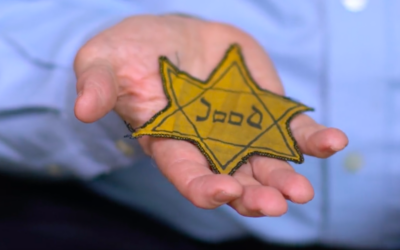
Finkelstein also reveals that the working title of the book had actually been It’s Not A Competition, Hitler Stalin Mum and Dad, but he bowed to his publisher’s better judgment.
Again, the observations of his mother on the German and Soviet dictators emerge.
“She used to say ‘Don’t start trying to work out who was worse, they were both terrible. We don’t need to start a league table,’” Finkelstein recalls.
“I think that’s correct. There’s no question they were both terrible crimes and I don’t feel I have to stack them up against each other.
“One thing I am insistent on, however, is that both of these ideologies brought terrible suffering. And it is not ridiculous to ask what are the common roots between them and the common crimes that they committed.”
Significantly in the book, Finkelstein describes the pact between Hitler and Stalin as the “most important political event in the lives of my parents”.
He says:”Because Stalinists and the Nazis had come to this pact it was possible for them both to invade Poland.
“My father’s story is propelled because the Soviets take over Lwów, or Lviv, as they turn it into.
And they arrest civic leaders including my grandfather and send their families to state farms in Siberia.
“My mother’s story, the invasion of Holland, is made possible by the Molotov-Ribbentrop Pact.
“Hitler didn’t have to worry about his other flank and was free to occupy other parts of western Europe.
“The crimes they committed together when you are trying to assess who was worse, Hitler or Stalin, never forget the crimes they committed together and only look at them for the crimes they committed apart.”
The family’s future seemed bleak when Grete and her daughters were sent to Westerbork labour camp in 1943, then to Belsen.
“I do think one of the most extraordinary things in the book are my aunt’s descriptions of Friday evenings in the concentration camps,” says the author, who also writes of the continued significance of Shabbat dinners with his family today.
They managed to survive almost certain death in Belsen as a result of Alfred’s hard work, securing the family, using false documents, a place on a tiny ‘exchange’ scheme in which prisoners were swapped with Germans who had been captured by the allied forces.
“I knew my mother was involved in an exchange, but it was so rare – it only involved around 136 people – that you can’t read about it in many general histories of the Holocaust,”says Finkelstein.
It would take the Nazi invasion of the Soviet Union in 1941 to ultimately shatter the pact between Hitler and Stalin and end the slaughter of millions of Poles.
The book goes on to detail how both families eventually settled and prospered in England.
Finkelstein is clear about what he wishes the reader to take from his latest work.
“I want people to understand the history of the middle of the 20th century through the lives of one family,” he says.
“I want them to be gripped by this story and to feel the emotions of it, and understand what some of these great big ideologies mean.
“What people take away from it politically, that’s up to them.”
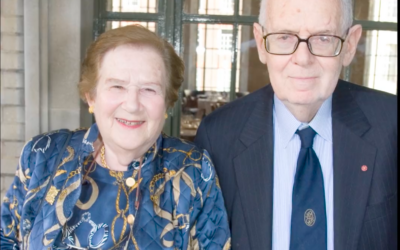
There is not doubt the book offers further weight to Finkelstein’s own impassioned defence of the need for moderate political discourse.
“The reason for doing the book was not just that I thought it was an amazing story,” he admits.
“I did think, in timeliness terms, that the dangers of extreme ideologies and a kind of decline in liberal democratic norms– those could be seen, and therefore there was something I could contribute just by telling the story.”
As his newspaper columns frequently suggest, Finklestein is concerned by the rise of populism, both on the left and on the right, not just in this country but in countries such as Israel.
“Populism everywhere is a dangerous idea,” says Finkelstein, who raises concern about the judicial reforms favoured by Benjamin Netanyahu’s coalition government, that have sparked protests both inside Israel and amongst expat communities across the globe, including the UK.
He speaks of the need for rule of law and “strong intermediary institutions who accept that politics is basically plural consisting of many different strands of views that have to be consolidated.”
Finkelstein adds:”That is my view of how every country should operate.
“Clearly for a Jewish state to move away from that view is extremely concerning, because Jews are one of the first victims when we move away from these kinds of pluralistic states. I do worry about it, yes.
“It’s most concerning.”
But the book also confirms that Finklestein’s own family history has left him “more assertive” when arguing in defence of the Jewish state.
Asked if the timing of his latest book, published in the aftermath of the community’s fight against antisemitism in Labour has been influenced by fears around Jeremy Corbyn’s ability to tap into populist sentiment in this country, Finkelstein’s reply is fascinating.
“Jeremy Corbyn obviously wasn’t a Stalinist,”he responds. “He was more of a Trotskyite.
“But where I do think there is in some Corbynite thinking is a sort of conspiracy thinking about elites, also shared on the right by someone like Donald Trump.
“Or by someone like Andrea Jenkyns or Jacob Rees-Mogg, who talk about some sort of abstract elite.
“It’s very important to mention that none of the people I’ve mentioned, maybe with the exception of Donald Trump, possibly, would think of themselves as thinking that way. But it’s quite dangerous.”
‘Hitler, Stalin, Mum and Dad ‘is published this week by William Collins and is available to purchase for £25.

Thank you for helping to make Jewish News the leading source of news and opinion for the UK Jewish community. Today we're asking for your invaluable help to continue putting our community first in everything we do.
For as little as £5 a month you can help sustain the vital work we do in celebrating and standing up for Jewish life in Britain.
Jewish News holds our community together and keeps us connected. Like a synagogue, it’s where people turn to feel part of something bigger. It also proudly shows the rest of Britain the vibrancy and rich culture of modern Jewish life.
You can make a quick and easy one-off or monthly contribution of £5, £10, £20 or any other sum you’re comfortable with.
100% of your donation will help us continue celebrating our community, in all its dynamic diversity...
Engaging
Being a community platform means so much more than producing a newspaper and website. One of our proudest roles is media partnering with our invaluable charities to amplify the outstanding work they do to help us all.
Celebrating
There’s no shortage of oys in the world but Jewish News takes every opportunity to celebrate the joys too, through projects like Night of Heroes, 40 Under 40 and other compelling countdowns that make the community kvell with pride.
Pioneering
In the first collaboration between media outlets from different faiths, Jewish News worked with British Muslim TV and Church Times to produce a list of young activists leading the way on interfaith understanding.
Campaigning
Royal Mail issued a stamp honouring Holocaust hero Sir Nicholas Winton after a Jewish News campaign attracted more than 100,000 backers. Jewish Newsalso produces special editions of the paper highlighting pressing issues including mental health and Holocaust remembrance.
Easy access
In an age when news is readily accessible, Jewish News provides high-quality content free online and offline, removing any financial barriers to connecting people.
Voice of our community to wider society
The Jewish News team regularly appears on TV, radio and on the pages of the national press to comment on stories about the Jewish community. Easy access to the paper on the streets of London also means Jewish News provides an invaluable window into the community for the country at large.
We hope you agree all this is worth preserving.


